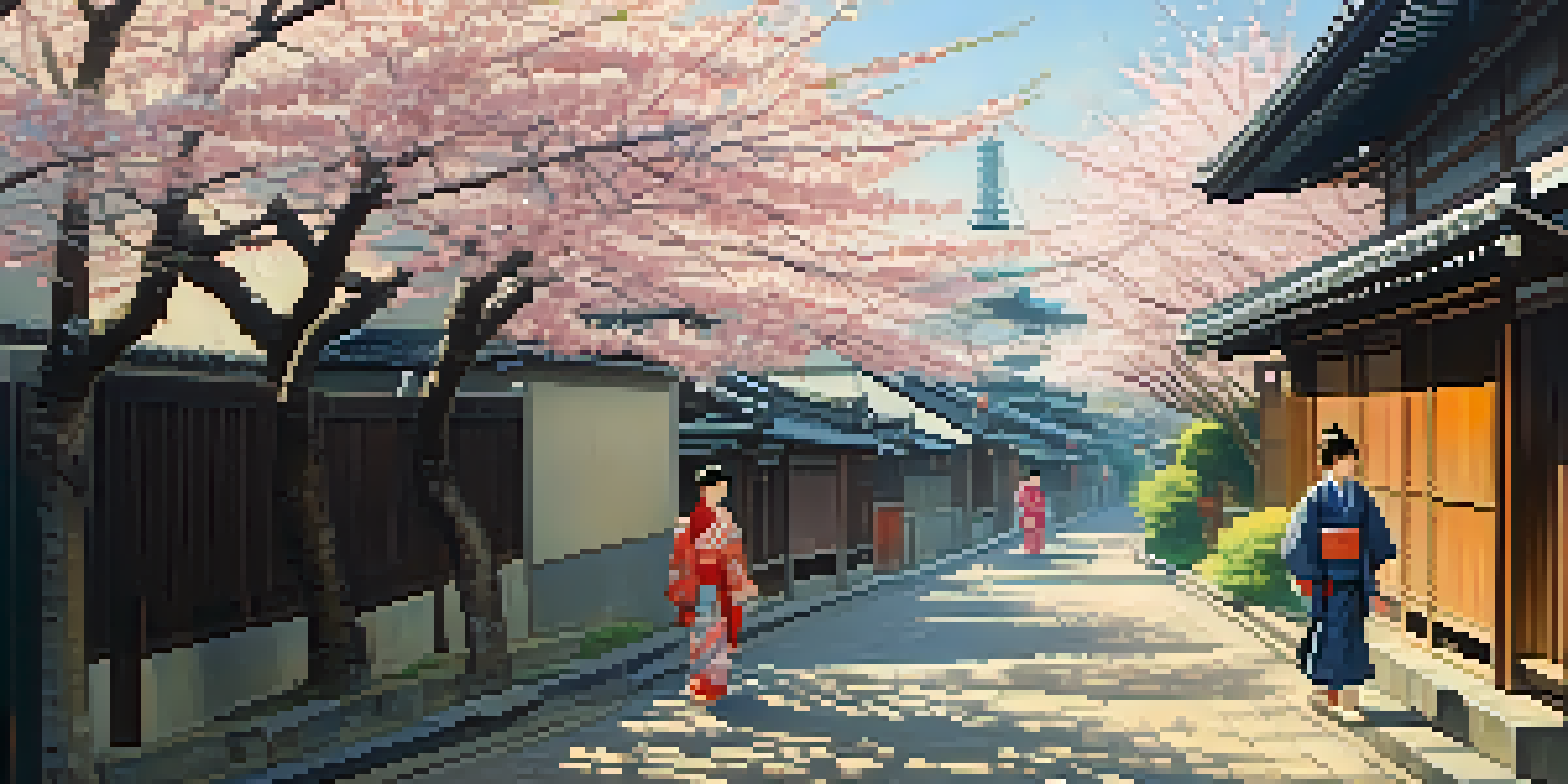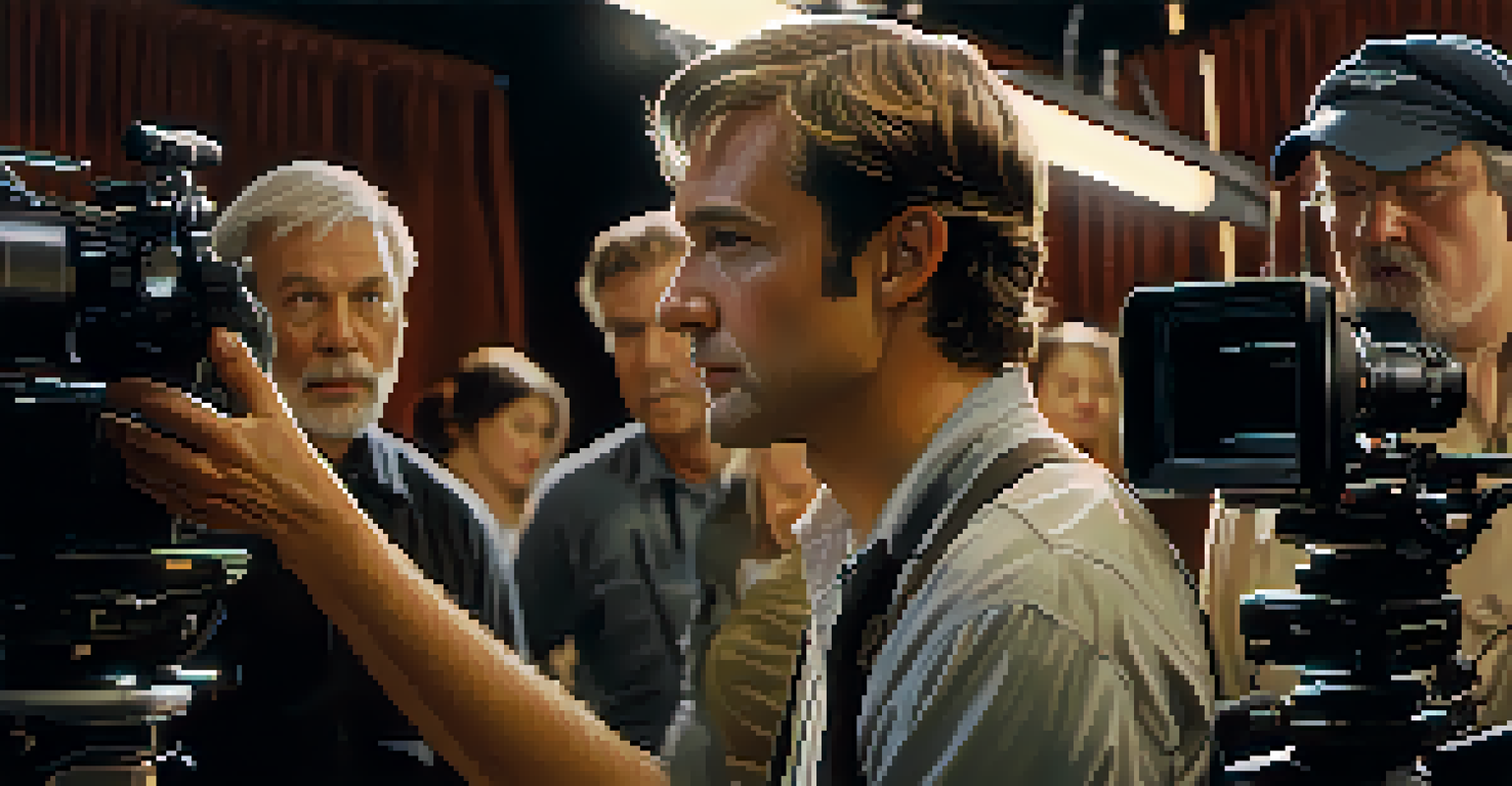The Mastery of Akira Kurosawa: Japanese Cinema's Icon

The Early Life of Akira Kurosawa: A Cinematic Foundation
Akira Kurosawa was born in 1910 in Tokyo, Japan, into a family that fostered artistic expression. His experiences during childhood, especially his exposure to visual storytelling, laid the groundwork for his future as a filmmaker. Growing up during a time of social and political upheaval, Kurosawa's early life would profoundly influence his cinematic themes.
To be an artist is to believe in life.
After initially pursuing a career in painting, Kurosawa shifted his focus to film in the late 1930s. His early work included assistant director roles, where he learned the intricacies of filmmaking. This period was vital, as it allowed him to cultivate his unique vision and narrative style, which would set him apart in the coming decades.
Kurosawa's debut film, 'Sanshiro Sugata,' released in 1943, showcased his innovative storytelling and visual techniques. This marked the beginning of a prolific career that would change the landscape of Japanese cinema forever. His early experiences and influences would serve as the bedrock for the masterpieces he would later create.
Influences on Kurosawa: A Blend of Cultures
Kurosawa's films are a rich tapestry woven from various cultural influences. He was deeply inspired by Western literature and cinema, particularly the works of Shakespeare and Dostoevsky. This fusion of Eastern and Western elements became a hallmark of his storytelling, allowing him to connect with diverse audiences.

Japanese traditions, including Noh and Kabuki theater, also played a significant role in shaping his cinematic style. The emphasis on visual composition and strong character arcs in these art forms can be seen throughout his filmography. Kurosawa's ability to integrate these influences created a unique narrative voice that resonated with viewers worldwide.
Kurosawa's Cultural Fusion in Film
Akira Kurosawa masterfully blended Eastern and Western influences, creating a unique narrative style that resonated globally.
This cultural synthesis is evident in films like 'Throne of Blood,' which adapts Shakespeare's 'Macbeth' into a samurai context. By blending these distinct influences, Kurosawa not only honored his roots but also expanded the global appeal of Japanese cinema. His work serves as a bridge between cultures, showcasing the universal themes of human experience.
Innovative Cinematic Techniques: A Visual Pioneer
Kurosawa is renowned for his groundbreaking cinematic techniques that transformed film language. His use of composition, movement, and lighting set new standards for visual storytelling. For instance, the dynamic camera angles and fluid movements in 'Seven Samurai' helped to create an immersive experience for viewers.
Film is a mirror that can reflect our own lives and the lives of others.
He was also a master of editing, often using a technique called 'cutting on action' to maintain the film's rhythm. This approach allowed for seamless transitions that kept the audience engaged. This innovative editing style was particularly evident in action sequences, where tension and excitement were amplified.
Moreover, Kurosawa's collaboration with cinematographer Asakazu Nakai resulted in visually stunning films that remain influential today. Their innovative use of natural light and shadow added depth to the storytelling. Kurosawa's legacy as a visual innovator persists, inspiring filmmakers around the world to push the boundaries of cinematic art.
Thematic Depth: Exploring Human Nature
At the core of Kurosawa's films lies a profound exploration of human nature and morality. His characters often face existential dilemmas, grappling with themes of honor, justice, and redemption. This exploration is vividly portrayed in 'Ikiru,' where the protagonist confronts his mortality and seeks meaning in his life.
Kurosawa's films frequently highlight the complexities of human relationships, showcasing both the beauty and tragedy of life. In 'Rashomon,' the narrative structure presents multiple perspectives on a single event, emphasizing the subjective nature of truth. This thematic depth encourages viewers to reflect on their own beliefs and experiences.
Innovative Techniques Redefine Cinema
His groundbreaking cinematic techniques, such as dynamic camera work and editing styles, set new standards for visual storytelling.
By delving into the human condition, Kurosawa's work resonates on a universal level, transcending cultural boundaries. His ability to portray characters with depth and vulnerability invites audiences to connect emotionally with his stories. This focus on humanity is what makes his films timeless and relevant across generations.
Iconic Films: A Legacy of Masterpieces
Kurosawa's filmography boasts a collection of iconic masterpieces that have shaped the history of cinema. Films like 'The Seven Samurai,' 'Yojimbo,' and 'Ran' are celebrated for their storytelling, character development, and visual artistry. Each of these works not only showcases his directorial prowess but also his ability to create memorable, relatable characters.
In 'The Seven Samurai,' Kurosawa masterfully blends action with profound character exploration, making it a seminal work in the samurai genre. This film not only influenced Japanese cinema but also inspired numerous Western films, including 'The Magnificent Seven.' Kurosawa's impact on global cinema cannot be overstated.
Moreover, his later works, such as 'Dreams' and 'Kagemusha,' continued to push artistic boundaries and explore complex themes. Kurosawa's films often reflect his philosophical inquiries, leaving a lasting impression on viewers. His legacy as a filmmaker is marked by a commitment to storytelling that resonates deeply across cultures.
Awards and Recognition: Celebrating a Cinematic Titan
Throughout his illustrious career, Kurosawa received numerous awards and accolades that recognized his contributions to cinema. He was the first Japanese filmmaker to receive an Academy Award, winning an Honorary Award in 1990 for his lifetime achievements. This recognition solidified his status as a global cinematic titan.
His films have also garnered critical acclaim at prestigious international film festivals, including the Cannes Film Festival, where 'Kagemusha' won the Palme d'Or in 1980. Such honors not only highlight Kurosawa's artistic excellence but also his ability to resonate with audiences worldwide. His films have become touchstones in film studies and are often included in discussions about the greatest films of all time.
Timeless Themes of Humanity Explored
Kurosawa's films delve into profound themes of human nature, morality, and relationships, inviting viewers to connect with his characters on a deeper level.
Kurosawa's influence extends beyond awards; he has inspired countless filmmakers, including Martin Scorsese, Francis Ford Coppola, and Steven Spielberg. His work continues to be celebrated in film schools and retrospectives, ensuring that his legacy endures for future generations. The recognition he received throughout his life reflects the profound impact he had on the world of cinema.
Kurosawa's Influence on Modern Filmmaking
The impact of Akira Kurosawa on modern filmmaking is undeniable, inspiring directors across the globe. His narrative techniques and visual style can be seen in films ranging from Westerns to contemporary dramas. Directors like Quentin Tarantino and George Lucas have openly acknowledged Kurosawa's influence on their work, particularly in storytelling and character development.
Kurosawa's films have introduced themes such as honor, sacrifice, and the complexity of human relationships to modern cinema. This thematic richness has paved the way for filmmakers to explore similar issues in their own narratives. The use of ensemble casts, a technique perfected by Kurosawa, has also become a staple in contemporary filmmaking.

Moreover, his approach to character arcs and moral dilemmas has shaped the way stories are told today. The emphasis on character-driven narratives, rather than solely plot-driven ones, can be traced back to Kurosawa's work. His legacy continues to inspire filmmakers to create stories that resonate on a deeper level.